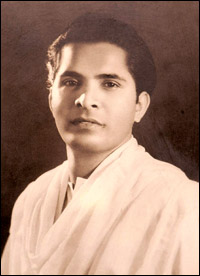|
Sunil Shantha :
Exploring his roots
Uvindu Illeperuma
Sunil Shantha, one of the most prestigious singers ever lived in Sri
Lanka, completes his 95th birth anniversary and the 28th death
anniversary on April 14 and 11. Being a pivotal figure in the
development of Sri Lankan music Sunil Shantha carved an exceptional
niche in the provision of Sinhala song. His songs always brimmed with
patriotism and the nature’s beauty.
Sunil Shantha was born in 1915 at Dehiyagatha, Jaela to a Christian
family. His parents died while Sunil was in his formative years.
Thereafter he was brought up by his grandmother and uncle. His uncle M.
J. Perera was a music lover, from whom Sunil Shantha learned how to play
the harmonium. It was how the foundation for a legendary musician was
laid.
|

Sunil Shantha |
This legendary personality always excelled in every task by leaving a
remarkable record behind. In 1933 he passed the teachers examination
just after emerging the island first in the school leaving certificate
examination.
At St. Calvery School he exhibited his mettle as a stellar teacher of
music by enabling the school to secure three consecutive victories at
the southern school music competition. It was in 1938 Sunil Shantha
passed Intermediate Gandarwa Examination. As he was gifted with the true
essence of Sinhalese spirit he thought it was high time to delve in the
depth of Sri Lankan arts and culture, With this thought in mind he
learned Sinhala folk songs and Wannam under the tutelage of Urapola
Banda Gurunnanse.
He was an artiste with the thirst to explore into roots of the
subject and left for India in quest of learning Hindustani classical,
Bengali orchestral and vocal music at Shanthi Niketan. But Shanthi
Nikethan could not quench the unabated thirst this personality had for
music. Then he left for Allhabad to read his Visharada Degree at
University of Bathkanda in 1944.
Influence of Hela school
After returning to the country he was addicted to the writing styles
of Munidasa Cumarathunga and Rapiel Tennakoon. Their writings made this
musician inspired to demarcate a considerable phase for pure Sri Lankan
music unspoiled by outside influences. In other words Sunil Shantha
became entrenched in Cmarathunga Munidasa’s Hela school. He gave up his
nomenclature of Joseph and adapted Sunil Shantha. Thinking that it was
his mission to acquit a true Sinhala music he began his expedition to
unearth the roots of Sinhala music under the auspice of Suriyashankar
Molligoda.
|
Songs by Sunil Shantha |
* Olu Pipeela
* Handapane
* Kokilayange
* Lanka Lanka Pembara Lanka
* Jesu Upanne
* Bowitiya Dan Palukan Ware |
Mudalali mafia which drastically exploited artists for profits was
unable to beat Shantha since he was not a man to kneel down before
money. Even at hard times in the aftermath of his expulsion from Radio
Ceylon he never betrayed his principle of self independence for material
gains.
Sunil Shantha stood as a pioneering force to feed indigenous music at
a time British harmonics and Portuguese kafferinghas saved the day for
Sri Lanka song buffs. His performance at the Radio Ceylon was unique.
Sunil Shantha sang Olu Pipila with his outstanding pupil Ivor Denis
on the day that Sri Lanka Broadcasting Cooperation was established in
1967. Olu Pipila was the first recorded song in Sri Lanka.
He vehemently opposed using Hindustani tunes. This self independence
cost him in great deal.
Role at the Radio Ceylon
He epitomized his unwavering independence by vehemently refusing to
audition by Indian musician Ratanshankar, who was the mentor of Sunil
Shantha at the University of Bathkande. He was not hesitant to say it is
rather ridicules to get down a musician from another country to test
talents of local artistes. He boycotted the test, hence was expelled
from Radio Ceylon. He mustered his glory and courage within him to go
out of Radio Ceylon and tried his hands at repairing radio sets, clocks
and cameras as a livelihood.
Sunil was fortunate to spread his mesmerizing voice beyond the
portals of the country. Radio Moscow could not help playing his hit
Puruthugeese Karaya which was set to speedy beat. Sunil published Ridi
Walawe, his first song book in 1946.
|
Song books by Sunil Shantha |
* Hela Ridi
Walawa
* Mihiriyawa Mal Mihira
* Heli Mihira
* Sunil Handa
* Song Folio
* Song of Lanka
* Guvan Thotilla
* Desheeya Sangeethaya
* Sangeethaye Atthiwarama |
One of the important fact regarding this colossal figure is his
singing for charitable purposes. Elders of Mallika in Colombo were
greatly benefited by this effort of him. In 1970 Sunil Shatha, an
indispensable man when it comes to Sinhala music, was invited by the
Director General of Sri Lanka Broadcasting Cooperation, Nevil Jayaweera,
to do music programs. Sunil Shatha welcomed the approach of the newly
appointed Director General. H. W. Rupasinghe and Maestro W. D. Amaradeva
stood very close in his endeavours..
Sunil’s voice added much more colour and vigour to the historic
cinematic creations namely Rekhawa and Sandeshaya directed by Lester
James Peiris
Evening era
1981 was not any good for Sunil Shantha with the sudden death of his
third son Jagath who was drowned in a swimming pool of a hotel in
Negambo. It is this shock that caused Sunil Shantha go on the journey of
no return on April 11, the same year.
Sunil still lives in our hearts. No doubt he will continue to live in
memories of generations to come. |



